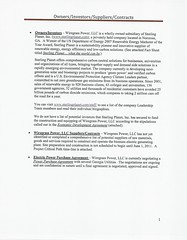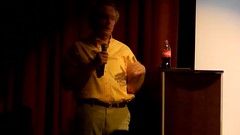Today, a number of Native tribes, from the Lakota in the Dakotas to the Iroquois Confederacy in New York to the Anishinaabeg in Wisconsin, battle to preserve the environment for those who are yet to come. The next seven generations, the Lakota say, depend upon it.Continue reading“Traditionally, we’re told that as we live in this world, we have to be careful for the next seven generations,” says Loretta Cook. “I don’t want my grandkids to be glowing and say, ‘We have all these bad things happening to us because you didn’t say something about it.’
Part of this family and spiritual obligation to preserve
Tag Archives: power
Solar as electricity for remote people
Continue readingDebby Tewa spent her first 10 years living without electricity, water, or a telephone in a three-room stone house in an isolated area of the Hopi Reservation in Arizona.
Today, as a contractor to the Sandia National Laboratories Sandia Tribal Energy Program, she provides technical advice about maintaining photovoltaic (PV) units to people on Indian reservations who live remotely like she did. For many, it’s the first time they’ve had electricity in their homes.
“I can identify with the people I’m helping,” Tewa says. “Many live the way I grew up, and I fully appreciate their excitement in having electricity and light at night.”
As part of Tewa’s job, she and program director
What do “the indigenous” think about solar?
Continue readingThe 3,000 members of the Jemez Pueblo tribe in New Mexico are looking to build the first utility-scale solar power plant on tribal land. They are also looking to make some money on it.
It is no secret that Native American tribes are more likely to be poverty-stricken and they generally have more than twice the unemployment rate of the United States. Former Jemez Pueblo governor James Roger Magdalena says, “We don’t have any revenue coming in except for a little convenience store.”
It is estimated this solar power plant could generate $25 million over the next quarter century and help create a sustainable revenue for his tribe.
Mr. Magdalena sees the environmental changes
“I’d put my money on the sun and solar energy.” –Thomas Alva Edison
“We are like tenant farmers chopping down the fence around our house for fuel when we should be using Nature’s inexhaustible sources of energy — sun, wind and tide. … I’d put my money on the sun and solar energy. What a source of power! I hope we don’t have to wait until oil and coal run out before we tackle that.”
— Thomas Alva Edison talking to Henry Ford and Harvey Firestone in 1931
-jsq
LAKE as a news medium
 We are the media, and you can be, too!
We are the media, and you can be, too!
According to the OPEN Government Act of 2007:
[T]he term ‘a representative of the news media’ means any person or entity that gathers information of potential interest to a segment of the public, uses its editorial skills to turn the raw materials into a distinct work, and distributes that work to an audience. In this clause, the term ‘news’ means information that is about current events or that would be of current interest to the public. Examples of news-media entities are television or radio stations broadcasting to the public at large and publishers of periodicals (but only if such entities qualify as disseminators of ‘news’) who make their products available for purchase by or subscription by or free distribution to the general public. These examples are not all-inclusive. Moreover, as methods of news delivery evolve (for example, the adoption of the electronic dissemination of newspapers through telecommunications services), such alternative media shall be considered to be news-media entities.
Here is the bill’s full text. The bill was sponsored by Sen. Patrick Leahy and 17 others, ranging from Sen. Barack Obama to Sen. Johnny Isakson. It was signed into law by President George W. Bush 31 December 2007.
![]() Of course that’s really just a detail, having to do with the
Wikileaks comparison.
Of course that’s really just a detail, having to do with the
Wikileaks comparison.
Most of what LAKE does has more to do with Georgia law, about open records requests and this passage, O.C.G.A. § 50-14-1-c.:
“Visual, sound, and visual and sound recording during open meetings shall be permitted.”
None of that requires a news medium. Any citizen can file open records requests or record public meetings. Remember, you are the media!
-jsq for
![]() LAKE, the Lowndes Area Knowledge Exchange
LAKE, the Lowndes Area Knowledge Exchange
“the citizenry has a right to scrutinise the state.” –Julian Assange
 Some people compare LAKE to Wikileaks, so let’s go there.
Julian Assange, like
Wendell Berry,
links the civil rights movement and the environmental movement.
He
then says:
Some people compare LAKE to Wikileaks, so let’s go there.
Julian Assange, like
Wendell Berry,
links the civil rights movement and the environmental movement.
He
then says:
“For the Internet generation this is our challenge and this is our time. We support a cause that is no more radical a proposition than that the citizenry has a right to scrutinise the state. The state has asserted its authority by surveilling, monitoring and regimenting all of us, all the while hiding behind cloaks of security and opaqueness. Surely it was only a matter of time before citizens pushed back and we asserted our rights.”
LAKE’s motto is:
Citizen dialog for transparent processThat makes Assange’s proposition
“the citizenry has a right to scrutinise the state”sound very familiar to us.
Locally it’s more a matter of elected and appointed bodies ignoring their chartered responsibilities to the public good and the general welfare. Well, many people are also tired of the permit inspection brigade, but that’s another story.
Assange also adds: Continue reading
Still no suppliers or buyers for Wiregrass Power LLC –VLCIA
 According to an open records request of 17 February 2011,
the Industrial Authority says Wiregrass Power LLC still
According to an open records request of 17 February 2011,
the Industrial Authority says Wiregrass Power LLC still
“has not yet identified or completed a comprehensive list of potential suppliers of raw materials, goods and services required to construct and operate the biomass electric generating plant.”This is on a sheet entitled “Owners/Investors/Suppliers/Contracts”, which also says:
“Site preparation and construction is not scheduled to begin until June 1, 2011.”Hm, what happened to breaking ground in January 2011? The document also said a “Project Critical Path time-line is attached” but it wasn’t.
Regarding buyers for the plant’s power: Continue reading
VDT Civics Lesson on How to Stop a Biomass Plant
 The VDT explains how to effect change, if anyone is listening.
Editorial, 13 Jan 2010,
Powerless to stop the power plant:
The VDT explains how to effect change, if anyone is listening.
Editorial, 13 Jan 2010,
Powerless to stop the power plant:
This week as the rhetoric around the proposed biomass facility has continued heating up, leading up to last night’s forum, one of the main themes has been that “government should do something.”
While the Times does not condone or condemn Chairman Paulk’s actions in the commission meeting Tuesday night, understanding the situation may help shed light on the issue. The county is powerless to do anything to stop this power plant. The only governmental entity with any power over the project is the city, and that’s only in the form of the services being extended and the water being sold to the company, as well as the sewage sludge that’s being burned. They too are powerless at this point to stop it.
 The editorial continues with the tired old excuse “they can be sued”.
Don’t they have insurance for that?
If the whole thing goes as bad as some opponents predict,
they could be sued for the kind of financial disaster
that faces Harrisburg, Pennsylvania.
The editorial continues with the tired old excuse “they can be sued”.
Don’t they have insurance for that?
If the whole thing goes as bad as some opponents predict,
they could be sued for the kind of financial disaster
that faces Harrisburg, Pennsylvania.
There is one governmental entity that does have the power. Ah, here it is: Continue reading
VDT Elevates Biomass and Renewable Energy as Political Issues
 “Proposed plant said to be ‘medical atrocity'”,
about Dr. William Sammons’ Monday
talk about health problems of biomass and how solar is better.
“Proposed plant said to be ‘medical atrocity'”,
about Dr. William Sammons’ Monday
talk about health problems of biomass and how solar is better.
The VDT then featured biomass in its reporting on the AAUW Candidate Forum: Continue reading
Why is the VDT suddenly anti-biomass and pro-solar?
Continue readingA growing organization of concerned citizens are opposing the building of a biomass energy plant in Lowndes County.
Wiregrass Activists for Clean Energy hope to promote clean and sustainable energies while also educating the public on how a biomass plant could be detrimental to community health.
The goal of the organization and the opposition to the plant is not to inhibit economic development but to promote a conversation on sustainable energy, Dr. Michael Noll, WACE president, said.
The new organization is not the only one in the community speaking out against the biomass plant.